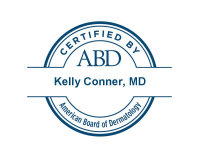Tip 1:
Avoid harsh detergents, perfumed soaps, and heavily fragranced lotions that tend to irritate the skin and trigger eczema. For
eczema patients: “If it smells good or says ‘baby’ on it, don’t use it!”
Tip 2:
It’s great that you are using sunscreen daily
but don’t forget to protect your eyes as well. Wide brimmed hats and sunglasses that provide UV protection are also an important part
of being “Sun Smart.”
Tip 3:
If you have acne, avoid occlusive ointments on the face such as petrolatum. Hair gel and other
hair products can worsen or cause acne on the forehead so make sure to keep them off of the facial skin.
Tip 4:
Choose make-up
brands that are and free of fragrances and dyes that can trigger eczema. Look for the term noncomedogenic if you are prone to
acne. Makeup bases that contain sunscreen are great for daily use to combat premature aging.
Tip 5:
Soothe your skin with regular
applications of a fragrance-free moisturizer to prevent itching and dryness.
Tip 6:
A daily vitamin and biotin supplements (2-3mg/day)
along with a balanced diet can be helpful in cases of brittle nails and thinning hair.
Tip 7:
Resist that urge to pop your pimples.
The trauma from popping pimples can lead to worsened redness and swelling and in some cases can cause scarring.
Tip 8:
Even
if you don’t feel “hot” you are still getting harmful UV rays while outside. Overcast days are infamous for causing bad burns because
sunscreen is frequently forgotten and the cooler weather keeps us outside for longer.
Tip 9:
Make applying sunscreen a part of
your daily morning routine. A daily moisturizer containing sunscreen helps to keep your skin from getting dry while at the same time
combating premature aging and skin cancer development.
Tip 10:
Wear sunscreen with an SPF of at least 30 anytime you expect to
spend more than 15 minutes in the sun. If you are going to be around reflective surfaces like water or snow, consider a higher SPF
and reapplying frequently (every 2 hours).
Tip 11:
Remember the ABCDE’s of melanoma: Asymmetry, Irregular Border, Color (black or multiple colors), Diameter (greater than 6mm or a pencil
eraser), and Evolution (change over time).
Tip 12:
It is clear that stress worsens skin diseases such as psoriasis and eczema.
Find some relaxing outlets to manage your stress such as jogging, yoga, or curling up with a good book.
Tip 13:
Be careful which
fabrics you wear. If you have eczema you should avoid wool or synthetic fabrics and instead try to stick with 100% cotton.
Tip
14:
Because water tends to dry out the skin, take short, warm showers and baths. If you're going to have your hands in water for a
long time (like when you're washing dishes or your car), try wearing gloves.
Tip 15:
The sun's rays are strongest between 10:00
AM and 4:00 PM, so make sure you reapply sunscreen frequently and take breaks indoors if you can. Other ways to mitigate the sun during
these hours is to seek shade whenever possible, wear wide-brimmed hats and long sleeves.
Tip 16:
For those rosy red cheeks in
rosacea, a sheer green-tinted primer is a good choice for a makeup base. The green tint can help visually correct redness and even
out skin tone. Get one with UVA/UVB protection and you'll help shield skin from exposure that can aggravate rosacea.
Tip
17:
The SPF is the “sun protection factor.” If you would normally burn after 10 minutes in the sun, a sunscreen with SPF of 30 would
allow you to stay 30 times longer in the sun before burning, or 300 minutes.
Tip 18:
Hair is most prone to damage when it is wet.
If you are struggling with hair loss or damage it is best to use a wide toothed comb or your fingers to detangle your hair when it
is wet. When it has dried it is safer to use a standard brush.
Tip 19:
Don’t neglect your lips when it comes to sun protection. Skin cancers on the lip are more aggressive and can be deadly. Your wide brimmed hat will help but consider a chapstick containing sunscreen for long sunny days.
Tip 20:
Any new or changing mole that itches, stings, or bleeds should be promptly evaluated by your doctor. Early detection of melanoma can be life saving.
Tip 21:
If your small cut or scrape seems to be getting worse despite application of Neosporin, consider switching to plain Vaseline or a double antibiotic ointment that does not contain neomycin as this is a very common cause of allergic contact dermatitis.
Tip 22:
Sunscreen stops working around 3 hours after applying so reapplication is key. Forgetting this fact often leads to unexpected burns after a long day out in the sun.









